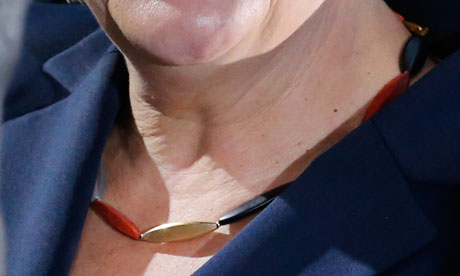 Put on your day dreaming cap. Let's assume that Bashar Assad wakes up next morning after a sleepless night with guilt of conscience for so much blood on his hands, and he agrees to resign and give himself up for fair trial at the ICJ at The Hague.
Put on your day dreaming cap. Let's assume that Bashar Assad wakes up next morning after a sleepless night with guilt of conscience for so much blood on his hands, and he agrees to resign and give himself up for fair trial at the ICJ at The Hague. Assume this will greeted with a big sigh of relief world-wide that another bad guy has been taken out, that military action in Syria is no longer necessary and the Syrians may be allowed to decide their country's future without foreign interference.
What would happen to Syria as it is left with a power vacuum? The experience of Egypt and Libya may be indicative.
The removal of a despot often creates a bigger problem than it solves. The ideal would be that the vacuum would be filled by an effective system of democracy leading not only to free elections but to a participative democracy in full regard to minority rights. But democratic culture roots slowly and in its infancy it is often quashed by bigger forces who are not prepared to wait to play the democratic game in order to get their seat of power.
The vacuum could be filled by extremists, fundamentalists or downright terrorists. Sometimes it is better the devil you know.
German elections
 The one and only direct debate between the major contenders has come and gone.
The one and only direct debate between the major contenders has come and gone. Although the SPD pretender Pier Steinbrueck has been generally awarded a narrow win on points, it was no blow out punch and certainly not enough to erode the wide margin that incumbent Merkel has in the polls.
It is symptomatic of the general apathy of the electorates that the media paid more attention to the necklace with the national colours that Merkel wore than to the real arguments of the debate.
But at least Steinbrueck had the courage to accuse Merkel of causing misery by imposing austerity on southern Europe.
"I would have followed a different crisis strategy. Of course there must be budget consolidation in these countries, but not a deadly dose," he said."Germany once got help too and we must not forget that. Germany was massively helped after the Second World War with the Marshall Plan."Yeah Yeah Steinbruek!! You would have got my vote if I had one. I was not impressed by Merkel's necklace.
Economic policy
To taper or not to taper!! That is the dominant argument in the US about the next steps in monetary policy. I am sorry but we are really missing the wood for the trees.
Fiscal policy
has lost its effectiveness. Many
countries have no fiscal space to manage demand levels in their economy. But we must ask ourselves whether it makes
sense to be so rigid with 3% of GDP or similar limits without making any
distinction between deficit caused by excessive consumption and deficit caused
by financing of productive infrastructure investment.
Monetary policy
has been overused to make up for the deficiency in fiscal policy. But we are finding out that beyond a
certain limit excessive doses of monetary accommodation have the same effect of
‘pushing on a string’ explained by Keynes in the General Theory. Worse still excessive monetary
accommodation is economic uncharted territory.
It could render its timely reversal destabilising and worse still, if
such timely reversal fails, it risks sowing the seeds for future inflation.
And if fiscal
and monetary policies have lost their effectiveness as the primary tools of
economic management, what tools are left for economic managers to increase the
potential productive capacities of their economies and restore economic growth
to pre-crisis levels?
Probably it’s time to go to basics. It is time to do the real economic restructure needed and to undertake the infrastructure investments to increase the growth capacity of economies. Rather than how much you spend it is more a case of how well you spend it.I would rather have a 5% deficit to finance infrastructure investment that generates true economic growth rather than a 3% deficit that leaves infrastructure deficiency unaddressed while scoring political points to boost unsustainable consumption.
No comments:
Post a Comment